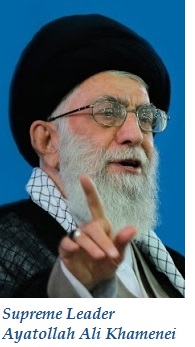The following are responses by Iranian officials on the GOP letter to Iran’s leadership.
Supreme Leader Ayatollah Ali Khamenei
 The letter is "the collapse of political ethics and the U.S. system's internal disintegration."
The letter is "the collapse of political ethics and the U.S. system's internal disintegration."
"American senators officially announced the commitment will be null and void after this government leaves office. Isn't this the ultimate degree of the collapse of political ethics and the U.S. system's internal disintegration?"
"The tone of the other party, particularly the Americans, becomes harsher, harder and more violent. This is part of their tricks and deceits."
—March 12, 2015, according to the press
"Of course I am worried, because the other side is known for opacity, deceit and backstabbing."
—March 12, 2015, according to the press
The team of negotiators appointed by Pres. @HassanRouhani has good, considerate& trusty members who work for the benefits of the country 1/2
— Khamenei.ir (@khamenei_ir) March 12, 2015But I'm worried because the other side in the negotiations has a habit of deception & treason. 2/2 #IranTalks #IranLetter
— Khamenei.ir (@khamenei_ir) March 12, 2015
Foreign Minister Mohammad Javad Zarif
Zarif expressed astonishment that some members of US Congress find it appropriate to write to leaders of another country against their own President and administration. He pointed out that from reading the open letter, it seems that the authors not only do not understand international law, but are not fully cognizant of the nuances of their own Constitution when it comes to presidential powers in the conduct of foreign policy.
Foreign Minister Zarif added that “I should bring one important point to the attention of the authors and that is, the world is not the United States, and the conduct of inter-state relations is governed by international law, and not by US domestic law. The authors may not fully understand that in international law, governments represent the entirety of their respective states, are responsible for the conduct of foreign affairs, are required to fulfil the obligations they undertake with other states and may not invoke their internal law as justification for failure to perform their international obligations.”
The Iranian Foreign Minister added that “change of administration does not in any way relieve the next administration from international obligations undertaken by its predecessor in a possible agreement about Iran’s peaceful nuclear program.” He continued “I wish to enlighten the authors that if the next administration revokes any agreement with ‘the stroke of a pen,’ as they boast, it will have simply committed a blatant violation of international law.” He emphasized that if the current negotiation with P5+1 [Britain, China, France, Germany Russia and the United States] result in a Joint Comprehensive Plan of Action, it will not be a bilateral agreement between Iran and the US, but rather one that will be concluded with the participation of five other countries, including all permanent members of the Security Council, and will also be endorsed by a Security Council resolution.
Zarif expressed the hope that his comments “may enrich the knowledge of the authors to recognize that according to international law, Congress may not ‘modify the terms of the agreement at any time’ as they claim, and if Congress adopts any measure to impede its implementation, it will have committed a material breach of US obligations.”
The Foreign Minister also informed the authors that majority of US international agreements in recent decades are in fact what the signatories describe as “mere executive agreements” and not treaties ratified by the Senate. He reminded them that “their letter in fact undermines the credibility of thousands of such ‘mere executive agreements’ that have been or will be entered into by the US with various other governments.”
Zarif concluded by stating that “the Islamic Republic of Iran has entered these negotiations in good faith and with the political will to reach an agreement, and it is imperative for our counterparts to prove similar good faith and political will in order to make an agreement possible.”
Mission of the Islamic Republic of Iran to UN - New York
—March 9, in a press release from Iran's U.N. mission
“This kind of letter is unprecedented and undiplomatic. In truth, it told us that we cannot trust the United States.
“Negotiations with the United States are facing problems due to the presence of extremists in Congress."
—March 10, 2015 in a meeting with top clerics
Parliamentary Speaker Ali Larijani
“Parliament and the government are following the same path.”
“We are together and there is coordination and consultation between government and the parliament... and all are under the supervision of the leader.”
“What the U.S. Congress did was really amateurish. Even their political experts denounced them because they undermined their own integrity. We are not going to copy their mistake.”
“The possible nuclear agreement would not face any problem in Iran in this regard [referring to the open letter by 47 U.S. lawmakers saying a deal might not last beyond President Obama’s tenure], Tehran does not have problems like those of the U.S.”
